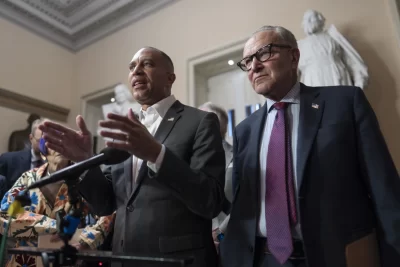
ATLANTA — Georgia’s Senate is backing a plan to give the state’s appointed election board the power to investigate Secretary of State Brad Raffensperger’s handling of elections, despite the measure’s sponsor saying that the bill is in “murky water” when it comes to its constitutionality.
The Senate voted 30-19 along party lines Friday for Senate Bill 358, sending it to the House for more debate.
The chamber’s Republican majority also on Friday pushed through a proposal to ban ranked-choice voting in Georgia on a 31-19 party-line vote. That bill also moves on to the House.
Raffensperger, also a Republican, says it is unconstitutional for the Senate to give the State Election Board the power to oversee an elected official.
“There is no precedent for an unelected board of political appointees to have oversight authority over members of the executive branch,” Raffensperger’s general counsel, Charlene McGowan, wrote Tuesday.
But Senate Ethics Committee Chairman Sen. Max Burns disagreed, saying Friday that the measure only alters legal powers that the General Assembly has given to Raffensperger and the election board, and not Raffensperger’s constitutional authority.
“The majority of powers of the secretary of state are vested through statute and not through constitutional law,” said Burns, a Sylvania Republican.
Burns has asked Republican Attorney General Chris Carr to provide an opinion on the measure’s constitutionality, saying Friday that even though it the measure is legally murky, the courts could sort out problems.
The proposal would remove Raffensperger from his nonvoting post on the board, three years after lawmakers removed him as the voting chair of the board. It would also allow the board to hire election investigators instead of solely relying on those working for Raffensperger and clearly give the board power to investigate the secretary of state.
Activists have been pushing the State Election Board to investigate whether Raffensperger mishandled his audit of Fulton County’s 2020 results, motivated by unproven claims of fraud. The board deadlocked 2-2 in December on whether it had such authority, and two members asked lawmakers to clarify the law.
Raffensperger’s steadfast defense of Georgia’s 2020 election, which Democratic President Joe Biden narrowly won, and his rejection of a call by Donald Trump to “find” more Republican votes made him a national figure. But Raffensperger is also a pariah among many Republicans, who continue pushing Trump’s false claims that Georgia’s 2020 results were marred by fraud and that Trump was the rightful winner. And those activists are pressuring Republican Georgia lawmakers, who face election this year.
Senators on Friday also voted to pass Senate Bill 355, banning any expansion of ranked-choice voting beyond Georgia’s current use of the practice in ballots sent to military members and other citizens living abroad.
Under the method, voters rank their choices in order. Lower finishing candidates are then eliminated and their votes assigned to the surviving candidates until someone reaches a majority.
Opponents say the practice needs to be prohibited because voters will be confused, results will be delayed, and people who only vote for one candidate will often see their vote go uncounted.
Republican Sen. Randy Robertson of Cataula, who sponsored the measure, said it’s a plot to manipulate elections.
“The purpose of ranked-choice voting, in many cases, is to cause confusion,” Robertson said, saying it would “eliminate third parties, to make those of us who may be considered radical, outspoken, nonconformist, to fall in line.”
But others say ranked-choice voting could allow Georgia to avoid its system of runoff elections, required when a candidate doesn’t win a majority in a first round of voting. They say runoffs usually have lower turnouts than earlier rounds of voting, and that voters dislike them.
“Because there’s more participation, it’s more democratic and can elect candidates that better reflect the views of the broad majority and middle of the electorate,” said Sen. Elena Parent, an Atlanta Democrat.
Parent said the bill is pointless because ranked-choice voting is only allowed in Georgia today on overseas ballots.
“There is no point to this bill,” she said. “There is no monster under the bed when it comes to ranked-choice voting.”
Florida, Idaho, Montana, South Dakota and Tennessee have previously banned ranked-choice voting, and some national conservative groups are pushing to end the practice in other states.







